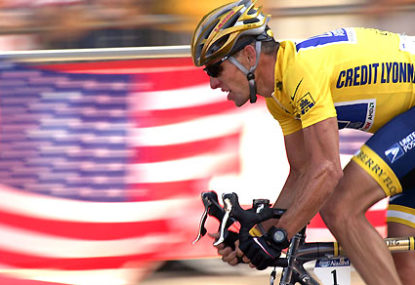For years the circumstantial and anecdotal evidence that Lance Armstrong was a drug cheat has piled up and for years people, such as myself, have dismissed it. Because we had answers.
They asked how could a man be so dominant for such a sustained period during an era when the peloton was so polluted with dopers?
We responded they should have a look at Lance’s VO2 results, the physical size of his heart and the sheer amount of training he put in.
How could a man whose body was riddled with and a deadly illness and decimated by both its poisonous cure ever come back and achieve such dizzying heights?
Easy – his cancer reshaped his body from that of a stocky, classics rider into a lean, physical specimen who was capable of powering up the Pyrenees. Perhaps more importantly, it gave him a mental toughness no other rider in the peloton could match.
How can you dismiss such damning evidence from former teammates, as has been presented from Tyler Hamilton and Floyd Landis over the last couple of years?
How can you believe anything from two blokes who spent years proclaiming their innocence and then admitted their guilt by saying “Lance did it too”?
Today brings questions without answers.
How do you respond to 1000 pages of evidence? To the sworn testimony of 26 people, including 15 riders? To 11 former teammates, including the up-until-now infallible George Hincapie, all of whom have received bans and retrospective disqualifications, so no one can argue they got off lightly in exchange for giving up Lance?
From a staunch and previously unshakeable defender of Lance Armstrong, I don’t know.
I wasn’t a fan of cycling as a sport until 2007 (some would say I was on the Cadel bandwagon, I say I had never been awake in the middle of the night and bored until then), so I didn’t see any of Lance’s Tour victories.
Anyone who was interested in cycling at that time would question why I ever had faith in Lance, given the climate.
The 2006 Tour champion, Floyd Landis, had been stripped of his title. The favourite for the 2007 Tour, Alexandre Vinokourov, was booted for doping mid-race. Days later the race leader, Michael Rasmussen, was ejected from the race by his own team under a doping cloud.
The eventual winner, Alberto Contador, was not able to defend his crown the following year because he had joined the highly suspect Astana team (which Vinokourov had been integral in creating) and they were not welcome to return in 2008.
As such, I didn’t come to love the sport naïve of its foibles. Neither did I come unaware of who Lance Armstrong was. Like many of Lance’s supporters, I knew him before I knew cycling.
I read his autobiography ‘It’s Not About the Bike’ in 2005 and was struck by two things. Firstly, he was so fiercely confident in his own ability it bordered on neurosis. Secondly, he was not the kind of bloke you would ever want to have a beer with.
But both these fed my belief he would not dope. Simply put, a guy with that much self-belief would have been offended by anyone who suggested he needed to.
As such, he helped fuel my love of cycling.
Sure my introduction to the sport had come about when the previous year’s winner, the pre-race favourite and the mid-race leader were all disqualified, and the eventual winner was not allowed to defend his title – all for reasons relating to doping.
My reasoned response was, simply, these guys might be cheats but they were trying to live up to the legacy the greatest athlete to ever compete in this sport had left.
Thus every cheat who was to follow was an argument in favour of Lance’s impeccable record, rather than mounting evidence he could never have achieved what he did without going to the same lengths these men had.
But there was more to it.
Lance was the man who came back from an illness that could have ended his life and should have ended his career as a professional athlete and, instead, won seven Tours de France. His story was the stuff of Disney movies.
There were those who smugly said they had a bridge in Sydney to sell us Lance supporters (a line brought up daily; how anyone thought they were clever constantly recycling someone else’s poor joke is beyond me).
Today they must be patting themselves on the back over how clever they were not to believe anyone could achieve something so extraordinary.
And good on them for backing the right horse. Lance was dirty. We who believed in him were wrong.
But sport is brilliant and magic for the unbelievable stories – for the man who played a rugby league grand final with a broken jaw, the woman who came back from an on-court stabbing to once again win a Grand Slam, the girl who surfs competitively after having an arm bitten off by a shark.
So for you who today so happily proclaim your victory as a Lance cynic, I ask, who would you rather be – the person who sees human achievement and wants to applaud it, or the person who seeks to belittle what others accomplish whenever it seems too good to be true?
Joe is the editor of Disaffected Middle Class





























































































